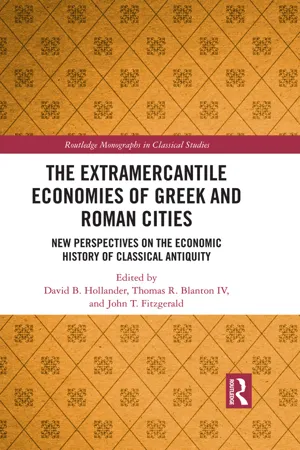
The Extramercantile Economies of Greek and Roman Cities
New Perspectives on the Economic History of Classical Antiquity
- 156 pages
- English
- ePUB (mobile friendly)
- Available on iOS & Android
The Extramercantile Economies of Greek and Roman Cities
New Perspectives on the Economic History of Classical Antiquity
About This Book
Recent work on the ancient economy has tended to concentrate on market exchange, but other forces also caused goods to change hands. Such nonmarket transfers ranged from small private gifts to the wholesale confiscation of cities, lands, and their peoples. The papers presented in this volume examine aspects of this extramercantile economy, particularly benefaction and the role of associations, as well as their impact on the market economy.
This volume brings together ancient historians, New Testament scholars, and classicists to assess critically the New Institutional Economics framework. Combining theoretical approaches with detailed investigations of particular regions and topics, its chapters examine Greek economic thought, the benefits of membership in private associations, and the economic role of civic euergetism from classical Athens to the municipalities of Roman Spain.
The Extramercantile Economies of Greek and Roman Cities will be of use to those interested in the economic context of ancient religions, the role of associations in the economy, theoretical approaches to the study of the ancient economy, labor and politics in the ancient city, as well as how Greek philosophers, from Xenophon to Philodemus, developed ethical ideas about economic behavior.
Frequently asked questions
Table of contents
- Cover
- Half Title
- Series Page
- Title
- Copyright
- Contents
- List of contributors
- Acknowledgements
- List of abbreviations and acronyms
- Introduction
- 1 The extramercantile economy: An assessment of the New Institutional Economics paradigm in relation to recent studies of ancient Greece and Rome
- 2 Early Greek economic thought
- 3 Benefactors, markets, and trust in the Roman East: civic munificence as extramercantile exchange
- 4 Euergetism and the embedded economy of the Greek polis
- 5 The economic and cognitive impacts of personal benefaction in Hispania Tarraconensis
- 6 New Institutional Economics, euergetism, and associations
- 7 The Economics of solidarity: mutual aid and reciprocal services between workers in Roman cities
- Epilogue
- Index